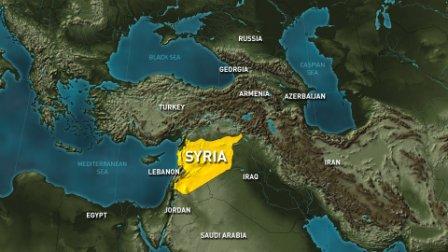 U.N. inspectors returned to Syria on Wednesday to look into at least a half-dozen claims of chemical weapons use -- some allegedly by the regime, others allegedly by rebels.
U.N. inspectors returned to Syria on Wednesday to look into at least a half-dozen claims of chemical weapons use -- some allegedly by the regime, others allegedly by rebels.
The team has already confirmed the August 21 use of chemical warfare near Damascus but did not explicitly say who was responsible. According to U.S. estimates, that attack left more than 1,400 people dead.
Among their tasks, investigators will try to figure out if chemical weapons were used in the northern city of Khan al-Asal in March. State-run media blamed rebels for the attack, which it said killed 25 people and injured more than 110 others. Syrian rebels, meanwhile, accused government forces of a chemical weapons attack on the rural Damascus suburb of Ateibeh.
But the inspectors face a litany of challenges, like trying to find physical and forensic evidence from more than six months ago.
Then there's the security situation. During the inspectors' last visit, mortar shells landed near their hotel in Damascus, and their convoy came under fire while en route to a scene.
And just like their investigation into the August 21 attack, the inspectors will only try to determine whether chemical weapons were used during this trip, not who was responsible.
A collection of some of Syria's most powerful rebel brigades have rejected a Western-backed opposition group that announced the creation of an interim government in exile this month.
The 13 rebel groups, led by the al Qaeda-linked al-Nusra Front, also called on supporters of the Syrian opposition to embrace Sharia law "and make it the sole source of legislation."
The move appeared to sideline the flagging National Syrian Coalition, which recently announced the formation of an interim government in exile led by Ahmad Tomeh, a dentist and dissident from the Syrian city of Deir Ezzor.
In a statement released late Tuesday, the 13 rebel groups declared that "the coalition and the putative government headed by Ahmad Tomeh does not represent or recognize us."
Among the signatory rebel groups were Ahrar al Sham, Al-Tawheed and Suqoor al-Sham, three major fighting factions that control considerable amounts of territory in Syria.
Members of the Syrian National Coalition contacted by CNN declined to comment, saying they were still working on an official response to the rebel statement.
In a speech Tuesday to the United Nations, President Barack Obama pledged $340 million in additional assistance to Syria, while reiterating his support for what he described as the country's "moderate opposition."
But moderate opposition groups appear to have suffered a series of setbacks this month as hard-line jihadi groups have pushed to grab more territory and resources.
Last week, another al Qaeda-linked group drove rival rebels out of the strategically placed town of Azaz near the Turkish border. The group, whose ranks are bolstered by foreign jihadi militants, later accused the ousted rebels of being traitors for supporting democracy and for meeting previously with U.S. Sen. John McCain.
Cash-strapped secular Syrian activists have been warning of the rise of Islamist groups in opposition-controlled parts of Syria.
"If anybody does a humanitarian project that is not under their (the Islamists') agenda, then they feel threatened," said one activist who runs humanitarian projects that help feed and house displaced families inside Syria. The activist asked not to be named, for fear of reprisal from Islamist groups.
Turkey, an opponent of the Syrian government that has long allowed opposition fighters to travel freely back and forth across its long border with Syria, has recently begun sounding the alarm about extremist groups.
"This is a big security threat to us, and it directly concerns us," Turkish President Abdullah Gul told journalists in New York last weekend.
"These people may not have been radicals or terrorists at all in the beginning, but the conditions have brought them to this point," Gul said. "People who would not harm a fly can find themselves in a position where they can mutually resort to atrocity and violence."
It is not clear what effect the Islamist rebel groups' announcement will have on Salim Idriss, the English-speaking former Syrian army general who now heads the Supreme Military Council of the rebel Free Syrian Army.
Idriss has enjoyed the support of Western governments and officials such as McCain. He was filmed in April at the Turkish-Syrian border receiving a shipment of nonlethal assistance from U.S. State Department officials.
Officials in the Supreme Military Council also declined to comment on the Islamist rebel announcement.
Portland and Seattle
Free Subscription to Breaking News
Free Subscription to Breaking News





















































































































































































































































































































































